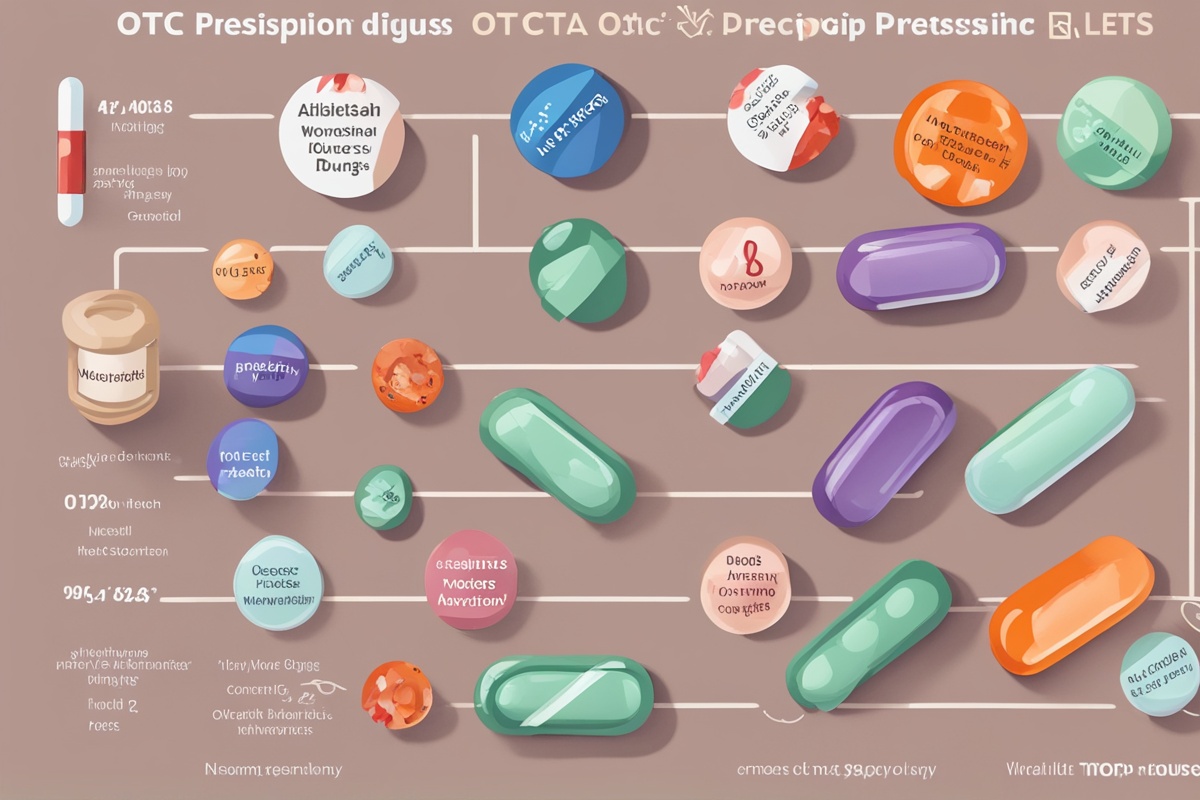Switching from prescription to OTC alternatives can feel like stepping into uncharted territory. You’ve been relying on a doctor’s guidance, a carefully tailored script, and suddenly, you’re wondering if an over-the-counter (OTC) option could do the trick. Maybe you’re tired of the hassle of refills, or the cost of a prescription is hitting your wallet harder than a ton of bricks. Perhaps you’ve heard about someone who made the switch and saved time and money without sacrificing relief. Whatever your reason, the decision isn’t one to take lightly. I’ve been there myself—navigating the maze of medications, weighing risks and benefits, and learning through trial and error what works and what doesn’t. In this post, I’ll walk you through the ins and outs of switching from prescription to OTC alternatives, offering practical advice, real-world insights, and a balanced perspective to help you make an informed choice.
Why Consider Switching From Prescription to OTC Alternatives?
Let’s start with the “why.” Prescription medications often come with a sense of security—they’re prescribed by a doctor who knows your medical history, and they’re often backed by rigorous testing for specific conditions. But they’re not always the most convenient or cost-effective option. Imagine you’re dealing with a chronic issue like seasonal allergies. Your prescription antihistamine works wonders, but every month, you’re jumping through hoops for a refill, shelling out a hefty co-pay, or waiting at the pharmacy. Then you notice an OTC version of a similar drug on the shelf for half the price. Why wouldn’t you at least consider making the switch?
OTC medications are often more accessible and affordable, and many are just as effective for mild to moderate symptoms. According to studies from institutions like the University of Minnesota Extension, which often explores consumer health trends, a growing number of drugs once available only by prescription are now OTC due to their proven safety profiles when used as directed. Think of drugs like omeprazole for heartburn or loratadine for allergies—both were once prescription-only but are now widely available. Switching can save you time, money, and stress, but it’s not a one-size-fits-all solution. You’ve got to weigh the pros and cons carefully.
Understanding the Differences Between Prescription and OTC Drugs
Before you even think about switching from prescription to OTC alternatives, let’s break down the fundamental differences. Prescription drugs are typically reserved for conditions that require close monitoring or have a higher risk of side effects. They’re often stronger, more specialized, or tailored to complex health issues. OTC drugs, on the other hand, are designed for self-treatment of common, less severe ailments—think headaches, colds, or mild pain.
Here’s a personal tidbit: a few years back, I was on a prescription pain reliever for recurring back pain after a minor injury. It worked, sure, but I didn’t love the idea of long-term use or the potential for dependency. After consulting my doctor, I learned that an OTC option like ibuprofen could manage my symptoms just as well for my specific case. The key difference? Dosage and oversight. Prescription drugs often come in higher doses or unique formulations, while OTC versions are capped at safer, lower strengths for general use. Knowing this distinction helped me feel confident in my decision—but it all started with a conversation with a professional.
Steps to Safely Switch From Prescription to OTC Alternatives
So, you’re ready to explore switching. Where do you start? First off, don’t go rogue. I can’t stress this enough—always consult your healthcare provider before making any changes to your medication regimen. They can help you identify whether an OTC alternative is appropriate for your condition and guide you on dosage and potential interactions.
Next, do your homework. Research the active ingredients in your prescription drug and compare them to OTC options. For instance, if you’re on a prescription antihistamine like cetirizine for allergies, you’ll find the same active ingredient in OTC brands like Zyrtec. But here’s the catch: the OTC version might come in a different dosage or form, so read labels carefully. A friend of mine once made the mistake of assuming an OTC decongestant was a direct replacement for her prescription allergy med, only to find it didn’t address her specific symptoms. Lesson learned—details matter.
Finally, start slow. If your doctor gives the green light, ease into the switch by monitoring how your body responds. Keep a journal if needed—note any changes in symptoms, side effects, or overall effectiveness. This step-by-step approach can save you from unnecessary discomfort or setbacks.
Potential Risks and Pitfalls to Watch Out For
Switching from prescription to OTC alternatives isn’t without its risks. One major concern is self-diagnosis. Prescription drugs are often tied to a specific diagnosis, while OTC meds are more of a “one-size-fits-most” solution. If you’re not addressing the root cause of your symptoms, you might be masking a bigger issue. For example, using OTC pain relievers for chronic headaches might provide temporary relief, but if those headaches stem from an undiagnosed condition, you’re only delaying proper treatment.
Another pitfall is the risk of misuse. Without a doctor’s guidance, it’s easy to overdo it with OTC meds, especially if you’re chasing the same relief you got from a stronger prescription. I’ve seen this firsthand with a family member who overused OTC sleep aids after switching from a prescription sedative, leading to grogginess and dependency issues. The lesson? Moderation and awareness are key. Always stick to recommended doses and durations, and don’t hesitate to reach out to a pharmacist or doctor if something feels off.
When Switching Might Not Be the Right Choice
Let’s be real—not every situation calls for switching from prescription to OTC alternatives. If you’re managing a serious or chronic condition like diabetes, high blood pressure, or severe asthma, OTC options are rarely a substitute. These conditions often require precise dosing and regular monitoring that OTC drugs simply can’t provide. I remember chatting with a neighbor who considered swapping his prescription blood pressure meds for an OTC supplement he’d read about online. Thankfully, he consulted his doctor first and learned that the supplement could interfere with his treatment. Dodged a bullet there.
Additionally, if you’re pregnant, breastfeeding, or have multiple health conditions, the stakes are higher. Drug interactions and side effects can be more unpredictable, so sticking with a prescription under medical supervision is often the safer bet. When in doubt, ask yourself: is the convenience worth the risk? If the answer isn’t a clear “yes,” it’s probably best to stay the course.
Tips for Making the Transition Smooth and Effective
If you’ve weighed the risks and decided to switch, let’s talk about making the process as seamless as possible. First, partner with a pharmacist—they’re an underutilized resource. When I transitioned to an OTC allergy med, my local pharmacist walked me through the options, pointed out generics that saved me a few bucks, and flagged potential interactions with other meds I was taking. Their expertise can bridge the gap between self-care and professional advice.
Second, keep communication open with your doctor, even after the switch. Check in periodically to ensure the OTC alternative is meeting your needs. And finally, listen to your body. If symptoms worsen or new issues pop up, don’t ignore them. Switching back to a prescription—or seeking a different solution—might be necessary, and that’s okay. Health isn’t a game of guesswork; it’s about finding what works for you.
References
- University of Minnesota Extension – Consumer Health Trends
- Missouri Botanical Garden – Health and Safety Resources
- Penn State Extension – Health and Wellness Resources
- New York Botanical Garden – Health and Safety Tips
- Colorado State University Extension – Consumer Health Guides
Disclaimer: This article is for informational purposes only, based on general research and personal experience—it’s not a substitute for professional medical advice. Always consult a qualified healthcare provider for personalized guidance tailored to your specific health needs and circumstances. Making changes to your medication regimen without professional input can lead to unintended risks or complications, so prioritize safety by seeking expert advice before switching from prescription to OTC alternatives.
This content is for informational purposes only and not a substitute for professional advice.


